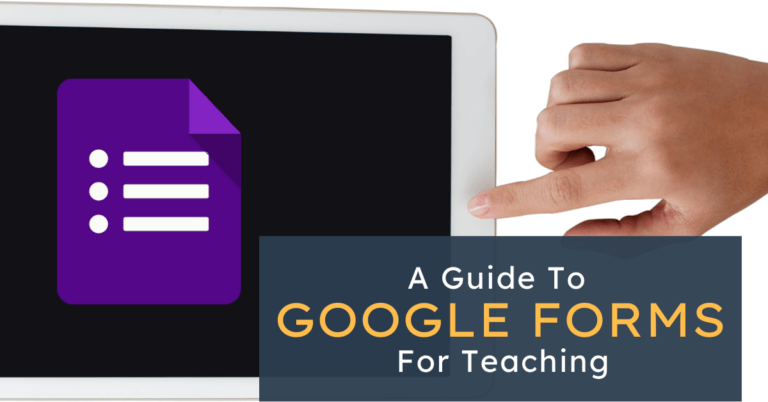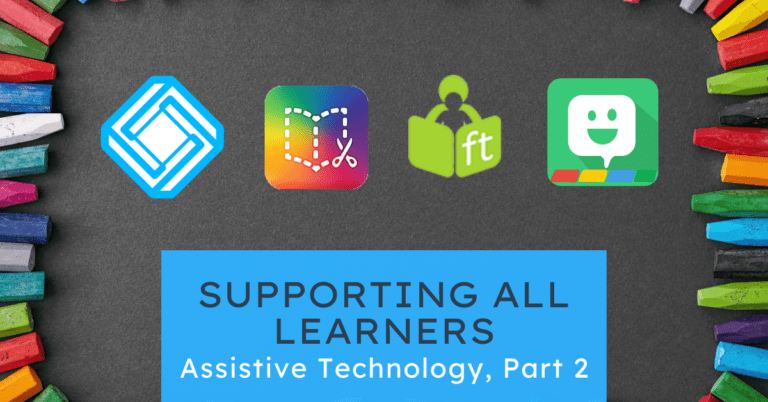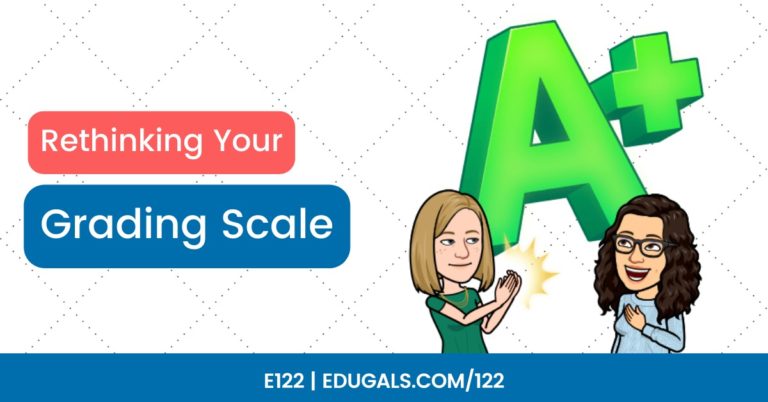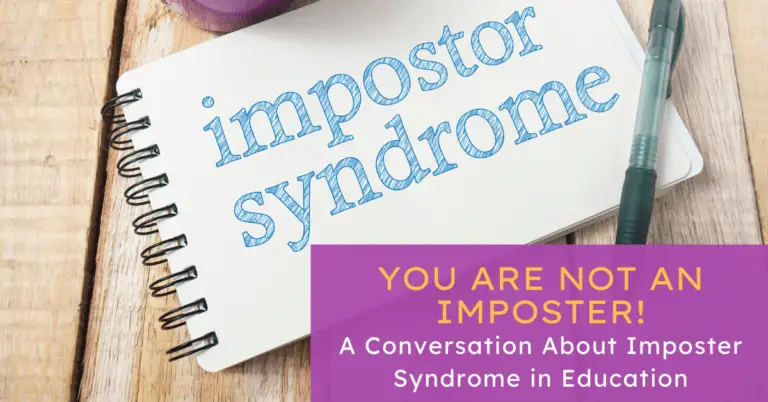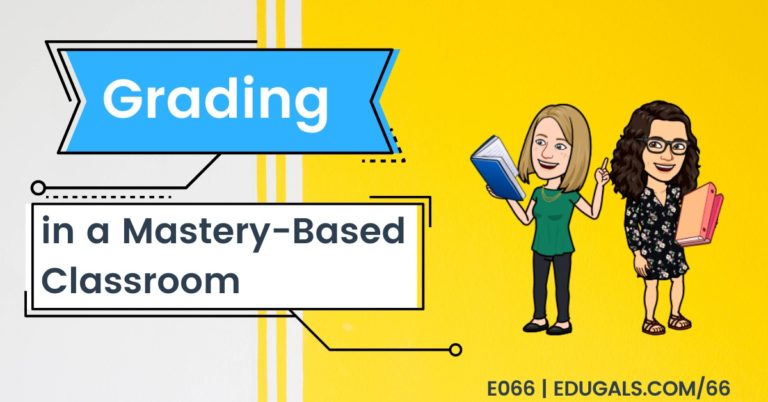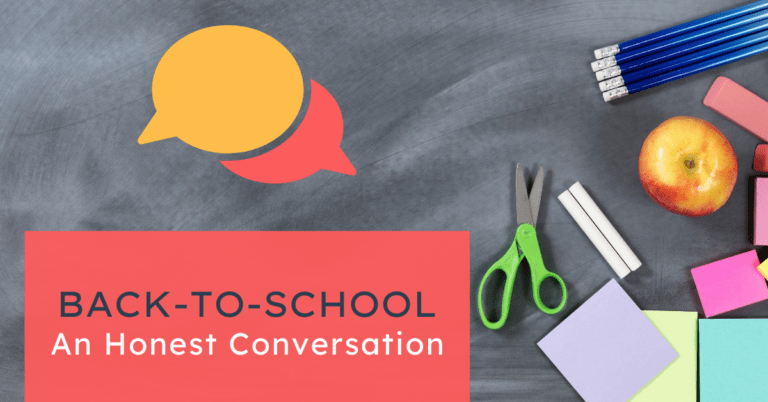In this episode, we are shaking it up a bit! Katie is going to be talking to Rachel about what she is doing with standards-based grading in the classroom. Rachel will share how her grading approach is shifting this year, where she is at now, and where she hopes to be!
If you like what you hear, we would love it if you could share this episode with a colleague or friend. And make sure you subscribe so that you don’t miss out on any new content! And consider supporting the show by buying us a coffee or two!
We would love to hear from you – leave a comment on our website OR check out our FLIP!
Show Notes
This week, we are talking all about grading. Specifically, Katie is interviewing Rachel about her grading approach this year, and the changes and shifts she is implementing in the classroom.
As with many big changes, it’s important to note that when trying out new strategies, we don’t have all the answers, nor do we know all of the details and impacts of these changes. The goal is to make changes, see how they affect student learning and success, and go from there.
This all stemmed from Rachel teaching IB classes this year, and her desire to come up with a more accurate understanding of where students are at (IB levels), and to help her more accurately know where they are at, and how she can support them and report grades more confidently.
We have done a few grading episodes in the past, and the two that are most relevant to this episode today are the following:
What Rachel is essentially doing is taking a standards-based grading approach, and adapting it to the IB world in her Grade 12 IB chem class.
One benefit to implementing it in this class is that she taught these same students last year in Grade 11. In the previous course, she used a specifications grading approach, which had her lay out the curriculum in terms of outcomes, and then briefly set up how many outcomes students needed to achieve a specific grade or level.
Grades in IB don’t carry over from one year to the next, so she wanted to approach the Grade 11 course in a way that took the pressure off the grade itself, and gave students the space to focus on learning, and getting a solid foundation of chemistry.
This approach is amazing because she has set up the expectations right from Grade 11 IB, so students walked into her classroom knowing that traditional grading practices are not likely with Dr. J., and it gives students a chance to experience education and learning differently, without fear of failing or stressing about grades.
With this in mind, Katie has prepared a few questions for Rachel to answer about her grading practices this year.
What is standards-based grading, and how are you using it?
In a nutshell, it’s grading based on the standards of the course; everything that is completed in class for grades is very closely tied and linked to the specific curriculum.
Standard in this context refers to whatever that base topic is – what you want your students to know and to be able to demonstrate mastery of.
There is a lot more detail that you can find if you want to dig into the research and do additional reading and learning.
Rachel attended a really great talk at the ChemEd conference this past summer, and it got her wheels spinning about how she wanted to grade in this specific course, and this is where she became inspire. The talk was called “Standard Reference Grading in Chemistry Classrooms” by a couple of educators from Missouri.
This talk worked so well with specs grading, that it seemed like the next natural step for her to take.
Standards-based grading typically is composed of a four level grading system, though approached differently than the traditional approach to grading. How does this transfer to a 7-level system like that of IB?
This is an area where Rachel is struggling a little bit. To approach this challenge, she has been creating mastery scales for her class, taking the four grade bands that are typical of a standards-based grading scale, and then determining how this would fit in the IB 7 level grade band.
Fitting one marking system in with another, is challenging, particularly when you are bound by a seven level scale in the IB world. But, she’s working to define each of the seven levels, and setting a distinction between the levels.
At the talk she attended, their break down of the 4 levels was a bit different. They looked at the skills, and had them building up within a specific topic. For example, if looking at chemical reactions, they would break down the content in the four levels. The most basic content that students need to know and need to be able to demonstrate would be level 1. They would then layer on additional content to create four different levels or standards.
It’s essentially taking the curriculum expectations and putting them into a hierarchical order to create a standards approach to grading. It’s a neat approach, as it allows you to lay out and see the hierarchy of content, and what students need to know before you can get to the next level.
The scale that Rachel has created is still a mastery scale, and does not have points attached to it. It’s about demonstrating master of the skills at each of the different levels, and the skills build from level to level.
Do you share your mastery level system with the students ahead of time?
As she creates these scales, Rachel does share them with her students. She is creating them as she goes through the course, giving herself time to better understand the skill progression and how it best fits together.
That being said, she ensures that these mastery scales are available for students as they get started with a module.
Knowing that the skills progress from one level to the next, this means that students need to be able to demonstrate all of the skills in order to advance up in levels to the highest standard.
Is it possible for there to be overlap between modules in terms of demonstrating a particular skills or outcome? Could there be another opportunity to demonstrate mastery in a future module?
Rachel believes that there is some crossover in terms of some of the skills students need to demonstrate, particularly with calculations and significant digits. Therefore, this skills may be represented at a later time on a different mastery scale.
Multiple opportunities to demonstrate a skill will still be offered to students in this format. She doesn’t yet know how many times students should be able to attempt a skills, but she’s going to start with two attempts and see how it goes.
If you have an overlapping skill in different modules, will you allow for the highest demonstration of that skills? Or will all attempts be included?
She isn’t sure of this quite yet. She wants to see how things progress over the semester, and then see where those skills are spread throughout the course. She needs to see the big picture to better inform next steps and potential impact.
What will due dates look like in your classroom
This will look like any of her classrooms in any other year. In terms of IB, the program is very test-oriented. With that in mind, the evaluations in the course are going to be tests, because she needs her students to be prepared for this type of evaluation. In IB, they write an exam at the end of the school year, and it’s worth 80% of their grade. Knowing this, it’s important that the course evaluations reflect that expectation and prepare them.
Last year, the class had a consistent test day every week, and students like that, so she is going to continue that. It might get shifted by a week or so, depending on the module and how long it takes to complete it, but those weeks without a test could be opportunities for second attempts of previous modules.
How are you going to communicate feedback to students?
Last year, Rachel was doing conferencing during midterm and final reporting. That is something that she wants to continue. The students will have IB levels after every module, so conferencing will help them to see their progress and better understand how they are doing in the course.
In terms of what that feedback is, throughout the modules there will be mastery checks that tell students if they need to go back and revise their work. Students need to check their work and make corrections prior to sitting down and working with the teacher to go over parts of the module that they are not understanding.
The goal is to get students to take the initiative, and to approach their work with a critical eye, thinking about what didn’t work and how they can correct it.
What is considered mastery?
For Rachel, mastery is getting 80% or greater on a particular learning outcome or section. It allows for errors, because everyone makes sense. This means that for each of the skills on the 7 point scale, the students need to demonstrate mastery (at least 80%) for each of those skills or outcomes.
This is essentially taking specs grading, blowing it up, and laying it out in more of a hierarchical order of skills that build on the previous one. It’s also breaking down the concepts that they need to know, which makes it easier for students to see and understand what they are learning.
It’s taking a bit of a step away from ungrading, because it is now equating it to a level, but it isn’t equating it to a percentage grade. This, combined with multiple opportunities will help to take away some of the stress around grades, and transfer the ownership on students to demonstrate mastery of learning.
Would it be worth considering not showing how the standards translate to IB levels?
This was something that Rachel thought about quite a bit. Even last year with specs grading, she had a conversion chart that indicated how many outcomes led to a level 7, 6, etc. Plus, grade 12 students are typically far more stressed about grades, so letting them see that conversion to the IB level system allows for a little more peace of mind.
Is there anything else that you’re not certain about or questioning?
Rachel is definitely questioning how her students are going to react to this approach. Her students know her from last year, so they know that she doesn’t talk grades at the beginning of the school year. They did ask about whether it would be the same as last year, but they didn’t push.
One thing that she isn’t questioning is the efficacy of mastery for learning. Students this year have retained more content and knowledge from their Grade 11 course than they have in any other past years that she has taught the course. Even students are surprised and shocked at how much they remember!
Any advice on where people can get started if they’re thinking about standards-based grading?
Rachel is happy to share some resources that our listeners might find helpful!
- ChemEd talk on Standards-reference grading in chemistry classrooms
- Mastery scales (example 1 and example 2)
